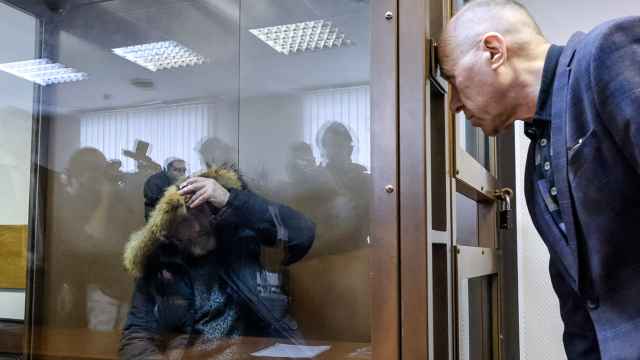The State Duma on Tuesday passed in the third and final reading the long-awaited economic crimes amnesty bill, which will free several thousand businessmen from the nation's prisons.
But despite the fact that the legislation was supported by all of the Duma parties when it was being prepared, only 298 deputies — members of the ruling United Russia party and the left-wing Just Russia party — voted in favor, out of a total of 450 deputies. The Communist Party and the nationalist Liberal Democrats abstained from voting.
Communist Party deputy head and Deputy Duma Speaker Ivan Melnikov said his organization abstained because of too much "subjectivity" in the implementation of the amnesty.
Unlike other bills, the amnesty does not need to go through the Federation Council and does not require a presidential signature because it falls exclusively within the Duma's mandate. President Vladimir Putin gave his blessing to the measure last month.
The amnesty, which will not affect jailed Yukos founder Mikhail Khodorkovsky and his business partner Platon Lebedev since it covers only first time offenders, was seen as a compromise between business groups and the Kremlin.
Khodorkovsky and Lededev are expected to walk free in 2014 under separate court decisions.
The compromise version of the amnesty bill slashed the number of violations covered from 52 to 27 articles, after pressure from Putin, who said "real criminals" might use it to leave prison.
While only 6,000 prisoners will be freed under the bill, the total number of those affected by it will be around 100,000 people, business ombudsman Boris Titov said earlier.
The larger figure includes people who were given a suspended sentence or have already served their prison term and those in pretrial detention.
Titov, who has been the main force lobbying the bill, said those who would receive amnesty would have their rights "fully restored." "They can run for office and work for the government," he told Kommersant on Tuesday.
Andrei Vyrkovsky, an assistant professor who teaches business journalism at Moscow State University, said the amnesty should have been given earlier.
"You can't compare economic crimes with crimes against a human being. Those are two completely unrelated things," said Vyrkovsky, who is a former senior correspondent for Forbes.
Experts said the main obstacle to the amnesty had been provisions of Criminal Code article 159, which addresses fraud. The article was the one most commonly used against businessmen, analysts said.
Only two of that article's chapters, regarding fraud of bank loans and entrepreneurial activity, were covered by the amnesty. Both of those provisions were added to the law only last year.
Titov told Kommersant that the only way for other businessmen sentenced under other provisions of this article is to accelerate the process of "reclassifying" their cases to make them eligible for amnesty.
But trial lawyer Eduard Sukharev said it would be almost impossible to do that. "Reclassification of the case means it has to be reconsidered again and courts are often reluctant to do it," he said.
According to Supreme Court statistics, 5,844 people were sentenced last year under article 159 — the majority of all those convicted under economic articles. Around 9,000 received a suspended sentence under the same article.
The amnesty also requires a person freed from prison to repay damages to those targeted by his crime, which might be a problem for some. However, Titov said earlier that the majority of criminal cases started against businessmen were initiated by police officers and did not involve other parties.
| Some of the articles of the Criminal Code covered by the amnesty | |
| Article No. | Subject |
| 159.1 | Bank loans fraud |
| 159.4 | Entrepreneurial fraud |
| 171 | Conduct of illegal entrepreneurship |
| 171.1 | Production, possession or sales of goods without tax stamps |
| 172 | Illegal banking activity |
| 174 | Legalization of cash or other property, obtained by third parties, using criminal means |
| 176 | Illegally obtaining credit |
| 177 | Gross negligence in repaying credit |
| 195 | Unlawful activity following bankruptcy |
| 196 | Deliberately filling for bankruptcy |
| 191 | Illegal trafficking of precious stones |
| 191.1 | Failure to fulfill obligations of a tax agent |
| 198 | Failing to pay duties |
| 199.2 | Hiding property or financial assets of an organization or an entrepreneur which should be used in paying taxes |
Source: The State Duma
Contact the author at [email protected]
Related articles:
A Message from The Moscow Times:
Dear readers,
We are facing unprecedented challenges. Russia's Prosecutor General's Office has designated The Moscow Times as an "undesirable" organization, criminalizing our work and putting our staff at risk of prosecution. This follows our earlier unjust labeling as a "foreign agent."
These actions are direct attempts to silence independent journalism in Russia. The authorities claim our work "discredits the decisions of the Russian leadership." We see things differently: we strive to provide accurate, unbiased reporting on Russia.
We, the journalists of The Moscow Times, refuse to be silenced. But to continue our work, we need your help.
Your support, no matter how small, makes a world of difference. If you can, please support us monthly starting from just $2. It's quick to set up, and every contribution makes a significant impact.
By supporting The Moscow Times, you're defending open, independent journalism in the face of repression. Thank you for standing with us.
Remind me later.






